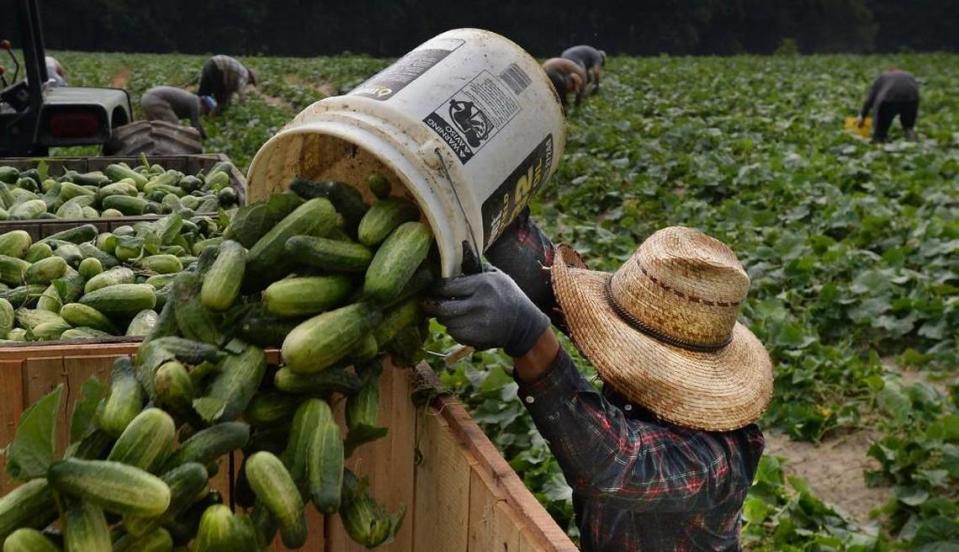Migrant farmworkers help NC farms survive. But some end up abused, lawsuits say.
A visa program designed to protect and provide for temporary farm workers has been used to abuse them in North Carolina, according to nine federal lawsuits filed since 2017.
Every year, thousands of migrant workers, drawn to the U.S. by the promise of good money, leave small towns across Mexico for the farm fields of North Carolina. Issued by the U.S. Department of Labor, the visas they hold, called H-2A visas, require paid transportation, $14.91 an hour currently, and clean housing while workers remain in the country up to 10 months at a time.
Many North Carolina farmers deliver on the promise. But several federal lawsuits filed recently allege that the H-2A program is sometimes misused to abuse, steal from and even traffic legal workers — a pattern of abuse by some farmers and farm labor contractors. It looks like this:
▪ Farm labor contractors, third parties between the growers and the workers, search poor Mexican towns for workers interested in earning substantially more on U.S. farms.
▪ Contractors illegally force some workers to pay hundreds or thousands in fees and travel costs to North Carolina, in some cases not delivering on promises that they’ll be reimbursed.
▪ Some workers are made to work longer hours for minimum wage. Others are given fewer work hours than they were promised.
▪ Contractors or farm owners sometimes take workers’ documentation, preventing migrants from leaving. Some make them work second jobs. Some physically or sexually abuse the visa holders, the lawsuits allege.
It’s human trafficking, said Trent Taylor, attorney at Farmworker Justice, a Washington, D.C.-based nonprofit, who has represented workers in several cases alleging the abuse of H-2A workers across the country.
It’s modern-day slavery, said Melissa Castillo, operations specialist with the nonprofit NC FIELD.
“It’s a complete disaster out here,” Castillo said. “But it’s clothed in all this bureaucracy, and it’s made to appear somehow by choice.”
But Marshall Wall, a defense attorney who has represented several North Carolina farm labor contractors in recent years, said poor treatment of these workers is rare.
Word travels fast, Wall wrote in an email. If contractors take advantage of workers, soon they won’t be able to find anyone to recruit.
“They are also subject to civil and criminal penalties if they violate the law,” Wall wrote. “A civil lawsuit claiming wage and hour law violations or ‘human trafficking’ can be financially ruinous for a farm labor contractor – or a farmer, many of whom are also sued for any alleged violations by an FLC (farm labor contractor).”
Many workers stream to NC farms
Since mid-2019, North Carolina employers filed requests for more than 88,000 workers on H-2A visas. Only four states, Florida, California, Georgia and Washington have requested more, Department of Labor data show.
Most of visa holders are young men from Mexico, who come here to earn nearly $15 an hour, the DOL’s current wage rate for the state. They harvest crops, run farm equipment and drive heavy machinery.
The work is hard. Here is how one Union County farm owner described the job on a recent visa application:
“Work outside in adverse weather conditions on a black surface in extremely hot (100+ degrees), cold (5 degrees) and/or wet weather for extensive periods of time, walk and stand for up to 9 hours, bend and squat repeatedly, lift, push/pull, carry and load up to 90 lbs (two man lift).”
Without H-2A workers to do these jobs, many farms would go out of business, said Alejandro Gutierrez-Li, an assistant professor of agricultural economics at N.C. State University. There are no longer enough domestic workers willing to labor on farm fields or enough undocumented migrants making their way to rural communities to take on agricultural jobs, he said.

Snakes, assaults and tracking chips
Celso González, a worker from a small town in Mexico’s smallest state, was eager to work in American agriculture, he said during a phone interview from the city of Texcoco in the state of Mexico.
The money he’d earn as an H-2A worker harvesting sweet potatoes, tobacco, cucumbers and watermelon in Rocky Mount would far surpass the less than $100 a week he made working construction.
Or so he thought.
Gonzalez, 35, took out a loan to cover transportation, food and fees on his way to eastern North Carolina in the spring of 2019, he said.
But González arrived at a farm damaged by Hurricane Florence, which ravaged the area months prior, he said.
There was only three to four hours of work to do a day for the first half of the season, he said.
“The job wasn’t what we thought it would be,” he said during the interview. “When we got there, there wasn’t enough work to go around. They said they hired too many people.”
To make matters worse, González alleges he was extorted. His contractor lied about reimbursing him for the nearly $700 in debt he took on for the job, he said.
Similar stories unfold in nine lawsuits involving H-2A workers in North Carolina in recent years, Charlotte Observer and News & Observer reporters found.
▪ In 2018, nine Mexican workers on H-2A visas left their homes to work in eastern North Carolina’s blueberry fields, one suit states.
But a recruitment scheme, run by contractor Francisco Valadez, Jr. charged the workers illegal fees and travel costs and left them in “crippling debt,” a 2020 federal lawsuit states. And when they got to North Carolina, there was little work and substandard housing.
At times, they slept outside, in a bus or in labor camps with filthy mattresses, snakes and no hot water, the lawsuit said.
The workers “had no way to purchase and/or prepare meals, launder their clothing, or bathe,” the lawsuit states.
In 2022, the migrants settled the case for $120,000.
Valadez, Jr. disputes the lawsuit’s claims and settled because he couldn’t financially afford to continue the lawsuit, he said in an interview. Legal Aid of North Carolina and the North Carolina Justice Center, the groups representing the workers, were too powerful to take on, he said.
“They are way too big for someone like us to fight,” Valadez, Jr. said.

▪ In 2020, three women boarded a bus from Mexico and set off to harvest sweet potatoes, melons and cucumbers in eastern North Carolina. They paid for their visas and travel to the U.S.
But when the women arrived, farm labor contractors Jose Gracia of Gracia Harvesting told them to work in the kitchen, cooking meals for other farmworkers. The work paid them only a fraction of what federal law mandates, a 2021 lawsuit states.
One woman fled. The others were too scared.
While at the farm, the remaining women worked as many as 100 hours a week with no overtime pay, the lawsuit alleged. One was not given enough water or food, prodded with hot objects, including a lighter and had her hair and eyelashes burned on a gas stove. She was also raped, the lawsuit alleged.
The workers settled the case against Gracia this year for $102,500. When reached by phone, Jose Gracia declined to comment.
▪ In 2022, Axel Enrique Campos Arroyo left Mexico for the farm fields of Wilson County, east of Raleigh. He was told he’d earn $14.16 an hour, according to a federal lawsuit. The complaint also alleges:
Arroyo paid recruitment costs, visa application fees, border crossing fees and for his travel to North Carolina.
Besides harvesting crops, Arroyo was told to work extra hours on a construction site at a high school in Apex, even though the H-2A program forbids unauthorized work.
Arroyo was paid less than $7.25 an hour for all the hours he worked. Then he had his passport confiscated, the lawsuit states.
Arroyo and others were told that their passports had a tracking chip embedded in it, and the farm owners “would be aware of their location if they ever took their passports and left their employment,” the lawsuit states. When he was found, he’d be arrested and deported, he was told.
In August 2022, Arroyo escaped, the lawsuit said. He walked to a nearby gas station where his brother, who lived in Montana, had a car waiting to take Arroyo to a Raleigh hotel.
His lawsuit against Lamm Farms and the farm labor contractors is pending. Lamm Farms and its attorney could not be reached for comment.

Contractors vs NC Growers Association
For decades, the North Carolina Growers Association, a not-for-profit group with 700 farms in its network, organized the recruitment and contracts of some 9,500 H-2A workers a year, said Lee Wicker, an association spokesman.
Unlike farm labor contractors, the growers association and the farms jointly employ the workers, with the association acting as the human resource department, Wicker said. The farms pay the growers association a fee for finding the workers, bringing them to North Carolina and navigating the bureaucracy that is the H-2A program.
But the association’s hold on that position has been slipping away as more farmers turn to for-profit contractors.
“Farmers go to farm labor contractors now because they think it’s a cheaper option,” Wicker said. “Well, you can’t do it cheaper and be in compliance with the law.”
Valadez, Jr, the farm labor contractor, disagreed. He said farmers are increasingly turning to contractors because contractors keep an employee on site, which helps the farmer resolve problems more quickly.
But it’s farm labor contractors who are often cited for skirting the law and trying to profit financially, said Castillo of NC Field. That’s been going on for years, according to one lawsuit.
A 2017 lawsuit said Cirila Garcia-Pineda, a farm labor contractor, was in debt and under investigation, when she had her daughter file an application to become a labor contractor herself. Using her daughter’s license, Garcia-Pineda brought in 13 migrants, forcing them to pay as much as $2,000 apiece in fake recruitment fees.
The migrants settled the lawsuit two years later for $75,000, records show.
An attorney for Garcia-Pineda could not be reached for comment.
Survey detected problems
In 2019, researchers with the U.S. Department of Justice interviewed 400 migrant workers in North Carolina, most of whom held H-2A visas.
About a quarter of them had experienced some type of employment abuse, such as intimidation. Nearly 18% said they were “trafficked” and about 5% said the amount of work available was different than was promised, the study found.
That’s what Gonzalez experienced in North Carolina in 2019, when he barely made more money here than he did in Mexico, he said.
“I felt bad,” he said. “I had done so much to come here, and there wasn’t even enough work.”
The roughly 20 hours of weekly work that were available for the first half of the season paid him about $80 to $120 a week, Gonzalez said.
Then there were bills. He and other workers paid $70 a week for daily meals on the farm, which wasn’t enough food to be properly nourished, he said. They also paid for additional groceries.
That was on top of the contractor declining to reimburse him and other migrant workers for travel costs from Mexico and visa processing fees, he said.
“The majority of the workers there were scared to do anything about it, and asked us why we had sued,” González said. “Workers force themselves to handle the abuse out of fear of losing work.”
Leticia Zavala, founding member of the advocacy group It’s Our Future, learned what was happening to the workers in Rocky Mount and directed them to an attorney, she said. Her group educates farm workers about their rights.
González and more than a dozen other H-2A workers successfully sued the farm labor contractor in November of 2019 to recoup most the money they promised would be reimbursed, Gonzalez said.
González saw for himself that not all jobs in North Carolina requiring H-2A visas were bad, however. He returned to Nash County in 2020 and 2021 and worked for a different employer, who treated him well and gave him sufficient work with good pay, he said.
“If I could come back, I would,” he said.

